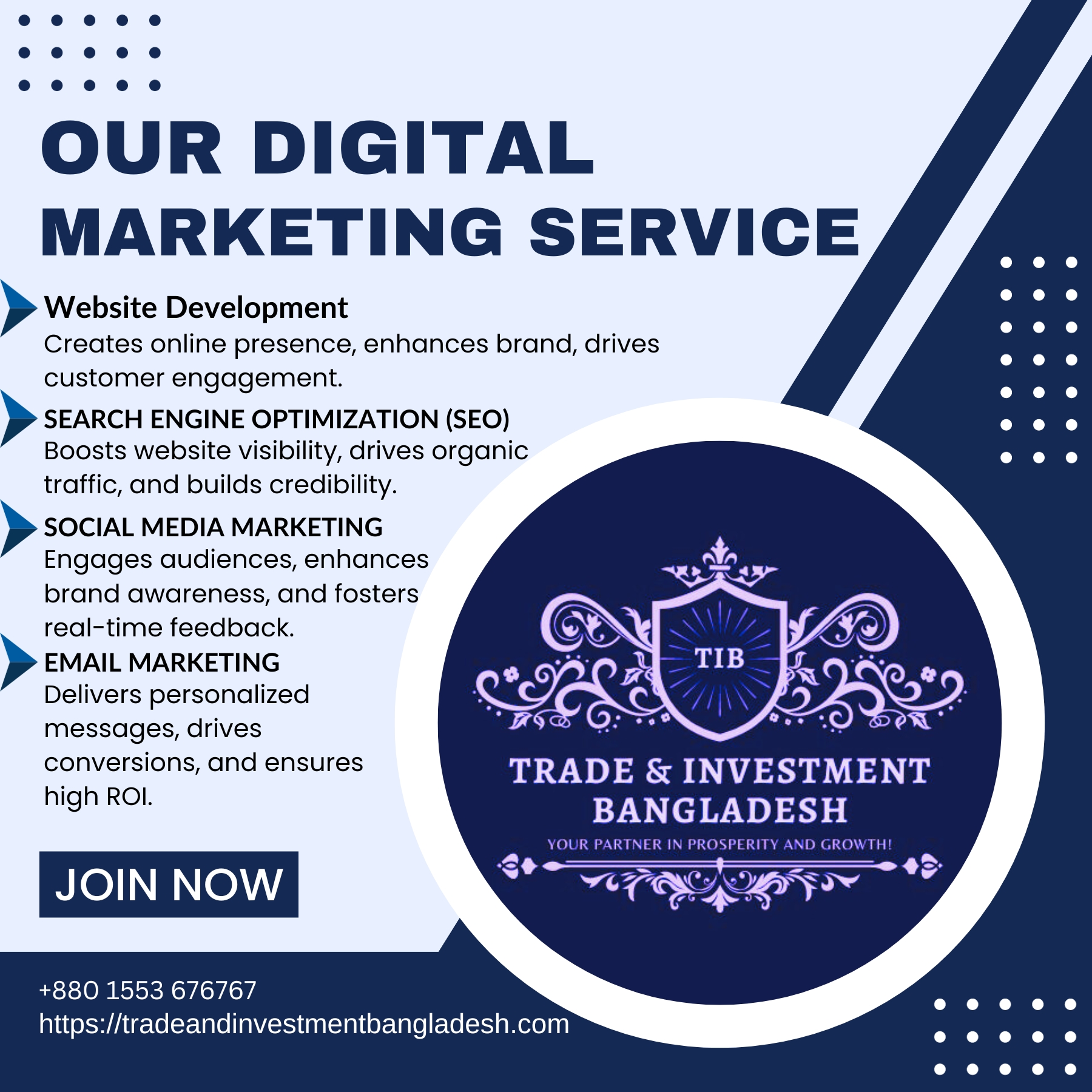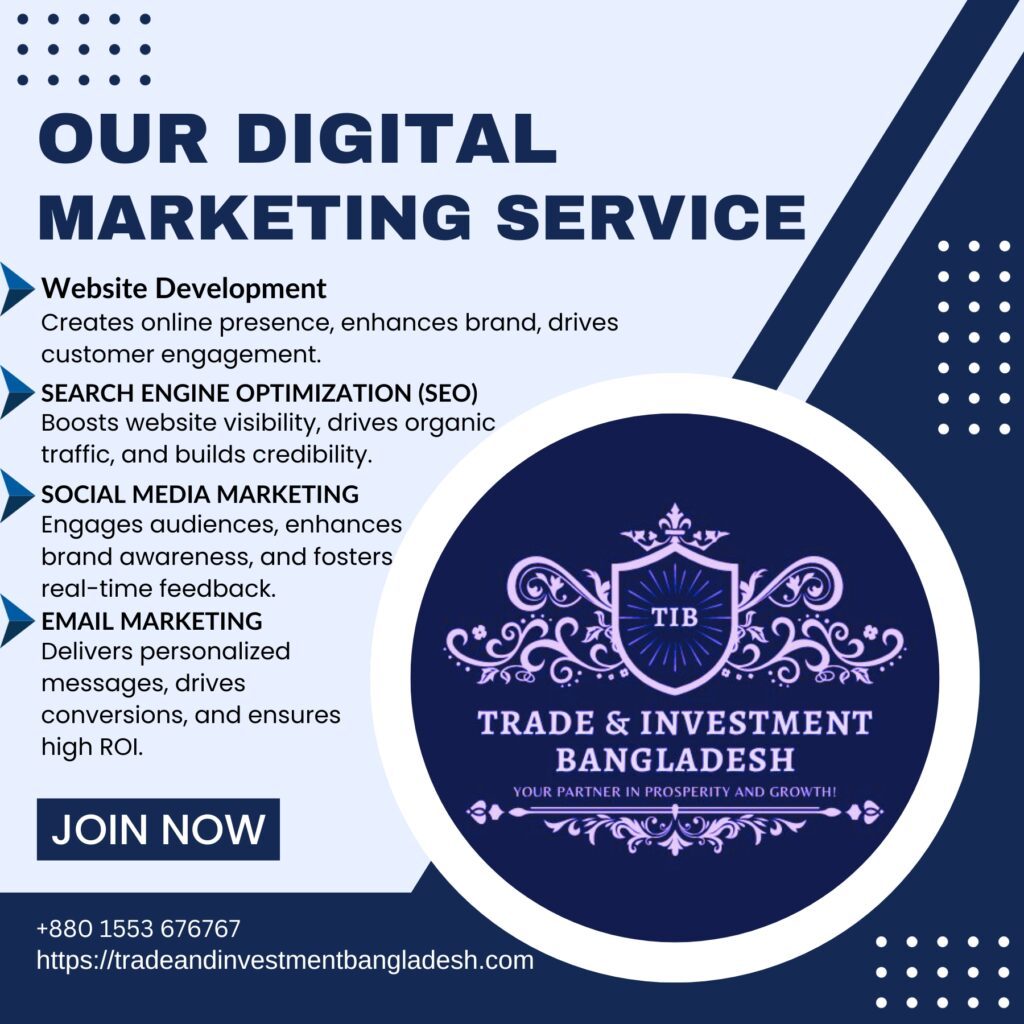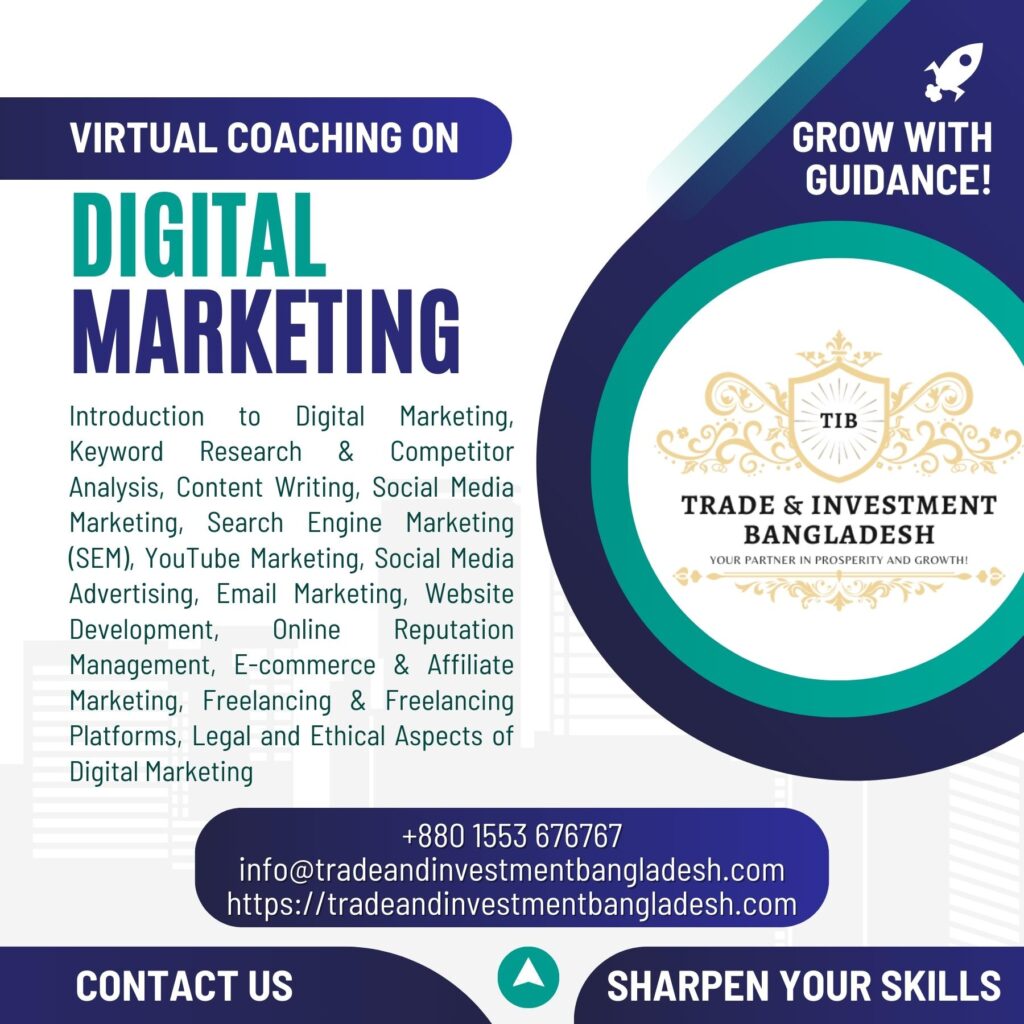
Digital Marketing Infrastructure
Digital Marketing Infrastructure
Md. Joynal Abdin, BBA (Hons.), MBA
Founder & CEO, Trade & Investment Bangladesh
In today’s rapidly evolving business landscape, a robust digital presence has become the cornerstone of success for organizations across industries. The digital realm has transcended being just a platform for communication and has grown into a multifaceted ecosystem that encompasses marketing, customer engagement, data analysis, and more. To thrive in this digital age, companies must continually adapt and reinforce their digital marketing infrastructure to remain competitive, relevant, and effective.
Digital marketing is no longer a supplementary component of a business strategy; it is the linchpin that connects companies with their target audiences. As consumers increasingly turn to online channels to seek information, make purchases, and interact with brands, organizations must build a solid digital marketing foundation to effectively reach and engage their customers. This infrastructure comprises a complex web of interconnected elements, ranging from website design and search engine optimization to social media management, content creation, email marketing, and data analytics.
The need for a well-structured digital marketing infrastructure has only intensified with the ongoing transformation of consumer behavior. The rise of mobile devices, the prevalence of social media, and the expansion of e-commerce have reshaped the way people interact with brands. To capitalize on these shifts, companies must not only embrace digital marketing but also refine their approach continually. This entails optimizing their online presence, leveraging technology and tools, and harnessing data-driven insights to make informed decisions.
A strong digital marketing infrastructure can yield numerous benefits for businesses. It can enhance brand visibility and recognition, expand the customer base, drive leads and conversions, and foster customer loyalty. Moreover, it can provide organizations with valuable insights into customer preferences and market trends, allowing them to make data-informed decisions and stay ahead of the competition. Additionally, a well-structured digital marketing framework can help streamline processes, reduce costs, and improve overall operational efficiency.
However, building and maintaining an effective digital marketing infrastructure is no small task. It demands a strategic approach, continuous innovation, and a clear understanding of the digital landscape. Companies need to be agile, adaptable, and proactive to harness the full potential of digital marketing.
In this guide, we will explore the key components of a strong digital marketing infrastructure and provide insights into how organizations can strengthen their digital presence. From website optimization and content strategy to social media engagement and data analytics, we will delve into the critical elements that make up a robust digital marketing ecosystem. Additionally, we will discuss the challenges and opportunities that organizations may encounter along the way and provide practical recommendations for success.
By taking a proactive stance in enhancing their digital marketing infrastructure, companies can not only navigate the ever-changing digital landscape but also thrive in it. In an era where digital innovation is the driving force behind business growth, the ability to strengthen and adapt one’s digital marketing foundation is crucial for achieving long-term success.

Digital Marketing Infrastructure:
Digital marketing infrastructure refers to the comprehensive framework and tools that organizations use to execute and manage their online marketing efforts effectively. This infrastructure is crucial in the digital age, as businesses rely heavily on the internet and digital channels to connect with their target audiences. Here’s a detailed summary of digital marketing infrastructure:
- Website: A well-designed and user-friendly website serves as the cornerstone of digital marketing infrastructure. It’s the central hub for all digital marketing activities. Websites should be optimized for search engines (SEO), responsive across devices, and feature compelling content that engages visitors.
- Content Management System (CMS): CMS platforms like WordPress, Drupal, or Joomla allow easy content creation, editing, and publishing. They are essential for maintaining an up-to-date and dynamic online presence.

- Email Marketing Tools: Email marketing is a powerful way to connect with leads and customers. Tools like MailChimp, Constant Contact, or HubSpot allow businesses to create and send targeted email campaigns.
- Social Media Platforms: A presence on popular social media platforms like Facebook, Twitter, Instagram, LinkedIn, and more is vital. Social media management tools such as Hootsuite or Buffer help streamline posting and monitoring.

- Search Engine Optimization (SEO) Tools: SEO is critical for improving website visibility in search engines. Tools like Moz, SEMrush, and Ahrefs assist in keyword research, site optimization, and tracking rankings.
- Pay-Per-Click (PPC) Advertising: Platforms like Google Ads and Bing Ads enable businesses to create targeted advertising campaigns. Proper infrastructure includes keyword research, ad creation, and budget management tools.
- Analytics and Data Tools: Tools like Google Analytics, Adobe Analytics, and Kissmetrics provide insights into website and campaign performance. These analytics help marketers make data-driven decisions.
- Customer Relationship Management (CRM) Software: CRMs like Salesforce, HubSpot, and Zoho CRM help manage customer data, interactions, and lead nurturing.
- Marketing Automation Platforms: Marketing automation tools like Marketo, Eloqua, and Pardot streamline marketing processes, including lead generation, lead nurturing, and email campaigns.

- Content Creation Tools: Software for graphic design (e.g., Adobe Creative Cloud), video editing (e.g., Adobe Premiere Pro), and content creation (e.g., Canva) is essential for creating engaging content.
- E-commerce Platforms: For businesses with online sales, e-commerce platforms like Shopify, WooCommerce, or Magento are crucial for managing products, inventory, and transactions.
- A/B Testing Tools: Tools like Optimizely and Google Optimize enable marketers to run experiments and optimize website elements for better conversion rates.
- Security Measures: Security infrastructure is crucial to protect customer data and maintain brand trust. This includes SSL certificates, firewalls, and data encryption.
- Content Distribution Networks (CDNs): CDNs like Akamai or Cloudflare enhance website speed and reliability, ensuring a smooth user experience.

- Mobile Optimization: With the growing use of mobile devices, a mobile-responsive design and mobile marketing tools are essential.
- Ad Tracking and Attribution Tools: These tools help marketers track the effectiveness of ad campaigns and attribute conversions to specific channels or touchpoints.
- Social Media Monitoring Tools: To track brand mentions and engage with customers on social media, tools like Brandwatch, Mention, and Hootsuite are valuable.
- Community and Customer Support Platforms: For engaging with customers, platforms like Zendesk or Freshdesk help manage customer support and community engagement.
Digital marketing infrastructure is not a one-size-fits-all solution; it should be tailored to a business’s specific needs and objectives. The success of digital marketing campaigns often depends on the integration and effective use of these tools and platforms within a coherent strategy. It’s a dynamic field that evolves with technology and consumer behavior, requiring ongoing adaptation and optimization to stay competitive in the digital landscape.
Top 10 Fruitful but Cost-Effective Digital Marketing Initiatives
In the ever-evolving world of digital marketing, it’s essential to find cost-effective strategies that provide a high return on investment. While it’s tempting to focus on the latest and most expensive marketing trends, there are several tried-and-true initiatives that can yield excellent results without breaking the bank. Here are the top 10 cost-effective digital marketing initiatives that can help you achieve your marketing goals:
- Content Marketing: Creating high-quality and relevant content is a cornerstone of digital marketing. It doesn’t require a significant financial investment but can attract and engage your target audience. Blog posts, articles, videos, and infographics can all be used to educate and inform your audience while showcasing your expertise.
- Search Engine Optimization (SEO): Optimizing your website for search engines is one of the most cost-effective ways to increase organic traffic. By focusing on keyword research, on-page optimization, and quality backlinks, you can improve your website’s visibility in search engine results, driving more organic traffic.

- Email Marketing: Email marketing remains a cost-effective and powerful tool for building and maintaining customer relationships. It allows you to reach out to your subscribers, share valuable content, promote products or services, and convert leads into customers.
- Social Media Marketing: Utilizing social media platforms like Facebook, Instagram, Twitter, and LinkedIn can be highly effective for brand building and audience engagement. Creating and sharing content on these platforms is relatively inexpensive and can help you connect with your target audience.
- Influencer Marketing: Partnering with micro-influencers or niche experts in your industry can provide cost-effective exposure to a highly engaged audience. They can help promote your products or services to their followers, increasing your brand’s credibility and reach.
- Online Communities and Forums: Engaging with online communities and forums relevant to your industry can help establish your brand as an authority. Participate in discussions, answer questions, and provide valuable insights. This not only drives traffic but also builds trust among potential customers.
- Content Syndication: Syndicating your content on platforms like Medium, LinkedIn, or industry-specific websites can expand your reach to new audiences. While you may need to adapt content for different platforms, it’s a cost-effective way to get your message in front of more people.

- Webinars and Online Events: Hosting webinars and online events can be a cost-effective way to connect with your audience and showcase your expertise. You can use platforms like Zoom or even social media live streams to engage with your audience in real time.
- Video Marketing: Video content has become increasingly popular, and creating engaging videos doesn’t have to break the bank. Use smartphones or inexpensive cameras to shoot videos, and platforms like YouTube or TikTok to share them. Video content often has a higher engagement rate and can be shared across various channels.
- User-Generated Content (UGC): Encourage your customers to create content related to your products or services. Sharing UGC on your website and social media platforms not only reduces your content creation costs but also builds trust, as it’s authentic and showcases real customer experiences.
By focusing on these cost-effective digital marketing initiatives, you can maximize your marketing budget while achieving substantial results. Remember that the success of your digital marketing efforts also relies on strategy, consistency, and adaptability. Regularly analyze the performance of these initiatives and adjust your approach based on the data and feedback you receive. With the right mix of these strategies and a commitment to delivering value to your audience, your digital marketing efforts can yield a fruitful return on investment without breaking the bank.
Closing Remarks
In today’s business landscape, the significance of digital marketing and a robust digital marketing infrastructure cannot be overstated. These elements are the lifeblood of a company’s success in a digitally driven world.

Firstly, digital marketing enables businesses to reach and engage their target audiences with unprecedented precision. It allows for tailored messaging, data-driven insights, and real-time interactions. By harnessing the power of digital channels, companies can foster brand recognition, boost customer loyalty, and ultimately drive revenue.
Secondly, a strong digital marketing infrastructure acts as the foundation upon which successful digital campaigns are built. It provides the tools and processes needed to create, implement, and optimize marketing strategies effectively. It also empowers organizations to adapt to the ever-evolving digital landscape, ensuring they remain competitive and responsive to market trends.
In today’s digital-centric era, companies that lack a robust digital marketing infrastructure risk falling behind their competitors. Therefore, every business should prioritize the development of a strong digital marketing framework. By doing so, they position themselves for long-term success, greater market relevance, and the ability to connect with customers in a way that resonates in the digital age. Digital marketing and its infrastructure are not merely trends; they are the bedrock of modern business success.

Strengthening Your Digital Marketing Infrastructure: Strengthening Your Digital Marketing Infrastructure
Mr. Md. Joynal Abdin is a Business Consultant & Digital Marketer based in Dhaka, Bangladesh. He is Founder & CEO of Trade & Investment Bangladesh, one of the leading Business Consultancy Firm in Bangladesh. He is also Co-Founder & CEO of Bangladesh Trade Center. Previously he served at Dhaka Chamber of Commerce & Industry (DCCI) as Executive Secretary; DCCI Business Institute (DBI) as Executive Director; SME Foundation as Deputy Manager; and the Federation of Bangladesh Chambers of Commerce & Industry (FBCCI) as Assistant Secretary.
The list of services Mr. Abdin is offering includes but not limited to Business Mentorship, Business Research and Documentations like Feasibility Study, Project Proposal Preparation, Writing Business Manual, Standard Operating Procedures etc.; Export Market Selection and Product Positioning at Home and Abroad; Buyers-Sellers Matchmaking; Website Development; Search Engine Optimization (SEO); and social media Marketing etc.
